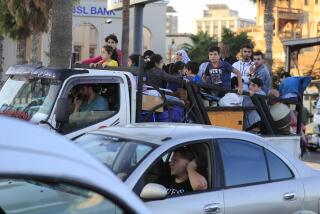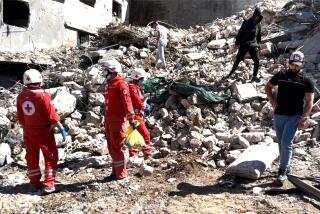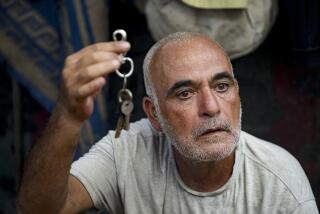Terror Finds Family 20 Feet From Safety
- Share via
MORINE, Albania — They escaped a burning village in central Kosovo. They endured a two-day trek to the border. But terror caught up with seven members of the Berisha family--cold and hungry and crammed into a tiny car--20 feet from the safety of Albania.
In the early morning darkness Sunday, their white Opel subcompact drove over a Serb-laid land mine just outside the Albanian line, killing five family members, injuring numerous other refugees in the same convoy--and highlighting the extreme danger confronting the uprooted ethnic Albanians in flight from Kosovo.
The death toll from the accident was minor compared with the mass killings reported elsewhere in the war-torn province of Serbia, Yugoslavia’s dominant republic. But this was a family who had made it out of the battle zone along one of the main escape routes from Serbian aggression. Just ahead of them, in a muddy clearing on the Albanian side, were relief workers with blankets, cold water and food.
“We almost made it to Albania,” said a grim-faced Rexhep Berisha, 38, who lost his mother, Nazmia, in the explosion and survived only because he had traveled in a wagon instead of the car.
Refugees from Kosovo encounter a host of perils from the time they flee their villages to their arrival in the ever-expanding refugee camps inside Albania and Macedonia. Along the way, there are uniformed thieves, rapists and thugs; the possibility of starvation; and war breaking out all around.
“Once they get here, we can feed them,” said Angela Walker, a spokeswoman for the United Nations World Food Program, which is passing out water, soup and high-energy biscuits to new arrivals. “Our concern is that they make it here.”
The Berishas, whose journey began Friday in the tiny Kosovo village of Bardhi, almost did.
Chased out of their home by Serbs and told to get out of the country, family members grabbed what they could. Nazmia Berisha, 64, her other son, his wife and the couple’s four children piled into their car.
About 3 a.m. Sunday, the Berishas had reached the Serbian border station; ahead of the family was a line of wagons.
To illuminate the roadway for the wagons, according to some of those on the scene, the Berishas pulled their car to the left side of the road. Another witness said the vehicle was blocking the route and that Serbian police asked the driver to back up a little, to behind a concrete-block wall.
In any case, the move proved to be fatal. In veering to the edge of the roadway, the car struck one of the mines that Serbian authorities have been observed laying on the Kosovo side of the border in recent days.
“For a moment, we thought something was falling from the sky,” Rexhep Berisha said. “We saw flames, and then bodies were everywhere.”
The blast wiped out the carload of Berishas, except for an 11-year-old boy who was hanging tenuously to life Sunday and his father, who escaped with minor injuries.
“I was feeling very bad before this accident,” said Nusret Gerguri, 37, a neighbor of the Berishas who was in a wagon just ahead of the blast. “Now everything is doubled. I feel terrible.”
The two women’s bodies were recovered, but authorities said the three young victims’ remains could not be found.
The border closed temporarily, but soon the procession of wooden wagons pulled by farm tractors, crowded cars, horse-drawn carriages and rain-soaked pedestrians started anew. By day’s end, the refugee camps in Kukes had nearly 10,000 new ethnic Albanian arrivals from Kosovo, authorities said.
As they crossed a narrow bridge into Albanian territory, refugees seemed to ignore the twisted wreckage of the exploded car that had come so close to its destination.
“Such explosions, you can see every day on the roads of Kosovo,” said Haxhi Nimani, 50, who fled Mitrovica for Albania. “We have seen so much along the way.”
More to Read
Sign up for Essential California
The most important California stories and recommendations in your inbox every morning.
You may occasionally receive promotional content from the Los Angeles Times.













